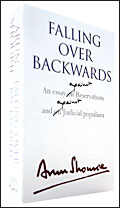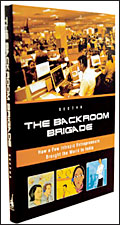 |
FALLING OVER BACKWARDS
An essay against Reservations and against
Populism
By Arun Shourie
Rupa
Pp: 378
Price: Rs 495 |
It's
a timely-and scary-reminder of how far we've trodden down the
"progressive" path. The book's tagline says it's "an
essay against reservations and against judicial populism".
And it lives up to that promise on every measure. Arun Shourie
begins the volume by quoting Pandit Jawaharlal Nehru's letter
to the chief ministers in which he makes a strong case against
caste- and religion-based reservations. "It has amazed me
to learn that even promotions are based sometimes on communal
or caste considerations. This way lies not only folly but also
disaster. Let us help the backward groups by all means but never
at the cost of efficiency. How are we going to build the public
sector or indeed any sector with second-rate people?" Shourie
quotes India's first Prime Minister as writing. And then goes
on to show how Nehru's followers, with active help from a so-called
"progressive" judiciary, turned his exhortations-and
the Constitutional safeguards against caste and communal quotas-on
their heads for narrow political expediency.
The book is replete with examples of Shourie's
erudition and grasp over his subject. He quotes extensively from
the Constituent Assembly debates and from the Constitution itself
to buttress his arguments. Nowhere, he points out, does the Constitution
say anything about reserving jobs, seats or any other privileges
for any religious, caste or ethnic group. Instead, it repeatedly
stresses equality based on non-discrimination. Where caste is
mentioned, it is only to prohibit discrimination on its basis.
Where it does speak of the underprivileged, it refers to backward
classes, women and children, never to caste or religion.
But, he adds, the very basis of the Constitution
has been subverted by self-serving politicians, the progressive
intelligentsia and the judiciary. He quotes several judgments
to support his arguments. Each successive judgment has hammered
another nail in the coffin. Result: standards are dismissed as
elitist, mediocrity has become the norm, vulgarity is authenticity,
intimidation is argument and assault is proof.
We live in extremely partisan times. Almost
every political, social or ethnic formation believes in some form
of the 'you are either with us or against us' paradigm. This means,
unfortunately, that Shourie's logic, sound and learned as they
are, will probably be appreciated only by those who see merit
in merit. The other half (or is it merely 49.5 per cent) will
doubtless dismiss this book as more Manuwadi propaganda. But that,
to paraphrase Nehru, will be a folly.
One word of caution for the would-be reader:
this is a tome for the serious scholar; but there's a lot in it
even for a more casual reader of social commentaries.
 |
THE BACKROOM BRIGADE
By Seetha
Penguin Portfolio
Pp: 212
Price: Rs 375 |
The Indian BPO industry
isn't just an industry. Rather, it's the child of many revolutions.
A revolution in information technology, a revolution in the mindset
of the Indian salary man, and a revolution in the way the world
sees India. From virtually nothing less than a decade ago, BPO
has become a $6.3-billion (Rs 28,350-crore) industry, employing
415,000 people. Suddenly, no global company (other than Apple,
that is) can hope to be competitive without offshoring work to
India. A lot has been written on this brand new phenomenon, but
it is to Seetha's credit that she puts it all in one place. Here
you'll meet the early BPO pioneers, read about their struggle
to a) convince their foreign parent-and only later, customers-to
ship work to India, b) overcome a primitive telecom network to
get their long-distance business going, and c) create an industry
out of hole-in-the-wall outfits. In other words, The Backroom
Brigade is an abridged history of India's BPO industry, except
that it is much more engagingly written than what a professional
historian could have ever managed.
|





